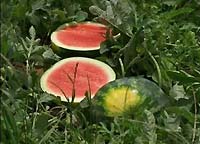Mini Watermelons Offer Producers Another Crop
Mini Watermelons Offer Producers Another Crop

Watermelons that fit into the palm of your hand are perfect for small families and singles. They also are a good fit for a group of Kentucky farmers.
About a dozen farmers are marketing the melons through the Green River Produce Cooperative. The melons are sorted at the facility and shipped to various groceries. In addition, growers produce and market cantaloupe and cabbage through the cooperative. Farmers are paid by the melon after they have been sold.
Cooperative General Manager Michael Gentry said the melons primarily are sent to large chain stores such as Kroger and Meijer. The Cooperative has marketed to school systems in the past and continues to look at that market, he said.
The mini watermelons, which also are seedless, are sorted into two sizes with the smaller size being preferred. Melons should weigh between four and eight pounds to be considered palm or mini watermelons, said Nathan Howell, an Extension associate for vegetable crops with the University of Kentucky Cooperative Extension Service.
“We are trying to get hold of the production measures and the marketing side of a new creature out there on the market,” Howell said.
The mini watermelons only have been on the market for a couple years and this is the first year the cooperative has tried them, Gentry said. About 20 acres of the small melons have been contracted to the cooperative from a number of counties.
“What we are trying to do is get our reputation into the market early,” Howell said. “If we can provide good produce and good pack out through the cooperative, hopefully the buyers will come back next year.”
The melons already are extremely popular especially in large cities, he said.
“That makes sense – say you’ve got an individual living in New York City that doesn’t want to carry a 30- or 40-pound watermelon up flights of steps or even carry it to their apartment and once they get there, they don’t have room to store it,” Howell said. “These personal size melons are ones they can handle and store in their apartments.”
When ripe, the quality and flavor are excellent, he said.
Helping growers understand the importance of picking at the right time and other agronomic aspects of growing these new melons is part of Howell’s job.
“I provide the educational link between the produce market, the University of Kentucky and the growers,” he said. “What we’ve done is gone to production meetings in the south where these have been grown before as well as collected data from research centers outside of Kentucky and compiled the information into a program for Kentucky.”
The melons are grown on black plastic, in raised beds and have a trickle irrigation system. Because they are seedless, a pollinator is needed and that is generally a larger, seeded watermelon variety. The large melons also are sold either by the cooperative or individually by the farmer.
There are some variety trials being done in the area, Howell said. However, the major buyer is interested in the variety the farmers are growing this year.
Mother Nature is the biggest production challenge. Wind this year has blown the vines around exposing melons to the sun leaving them to become sunburned and not suitable for sale. Hail and excess rains have also been a factor this year, although in general the crop looks good.
Weed and pest control also are critical to successful production.
The melons are just beginning to ripen. Each field will be picked three times and should be arriving in stores soon. To find one, look for a Kentucky bin, the label on the melon will identify is as the Mohican variety marketed by Farm-Wey Produce Inc., which is the company Green River used to market its products.